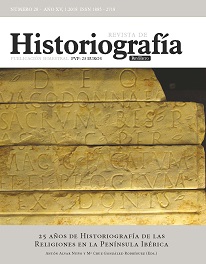Sagunto y Numancia como exempla históricos en la oratoria parlamentaria de la España liberal (1868–1939)
DOI:
https://doi.org/10.20318/revhisto.2018.4217Resumen
Resumen: En el s. XIX España necesitaba consolidar su identidad nacional y para ello era necesario fijar los rasgos que definían el carácter y temperamento de la raza española. En este contexto, personajes y gestas del pasado remoto de España eran los que mejor podían reflejar la idiosincrasia de la emergente nación. Una de esas gestas fue la que protagonizaron los habitantes de Sagunto y de Numancia, dos ciudades que simbolizaban la lucha heroica de todo un pueblo por su libertad e independencia. En este artículo se analiza el uso que se hace de Sagunto y Numancia en los discursos que se pronunciaron en el Congreso de los Diputados desde la Revolución de 1868 hasta el 2 de febrero de 1939, última reunión de las Cortes en territorio español.
Palabras clave: Sagunto, Numancia, Oratoria política, Exempla históricos.
Abstract: In the 19th century, Spain sought to consolidate its national identity. To bear this out, it had to fix the traits that defined the character and temperament of the Spanish people. In this context, what best reflected the idiosyncrasy of the emerging nation were the personalities and the heroic feats of the remote past of Spain. Such was the case of the deeds carried out by the inhabitants of Sagun tum and Numantia, two cities which symbolized the heroic struggle of a people for their freedom and independence. This paper analyses the use of Saguntum and Numantia as historic exempla in the speeches delivered to the Congress of Deputies between the Glorious Revolution of 1868 and 2 February 1939, the day the courts met in Spanish territory for the last time.
Key words: Saguntum, Numantia, Political oratory, Historic exempla.
Descargas
Descargas
Publicado
Número
Sección
Licencia
El titular de los derechos de autor de los contenidos de esta revista es el Instituto de Historiografía "Julio Caro Baroja" de la Universidad Carlos III de Madrid.
